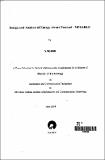Please use this identifier to cite or link to this item:
http://drsr.daiict.ac.in//handle/123456789/67| Title: | Design and analysis of energy aware protocol-MPEARLE |
| Authors: | Ranjan, Prabhat Mythili, S. |
| Keywords: | Energy aware protocol Energy aware protocol MPEARLE Routing protocols Wireless sensor networks |
| Issue Date: | 2004 |
| Publisher: | Dhirubhai Ambani Institute of Information and Communication Technology |
| Citation: | Mythili, S. (2004). Design and analysis of energy aware protocol-MPEARLE. Dhirubhai Ambani Institute of Information and Communication Technology, 73 p. (Acc.No: T00030) |
| Abstract: | Due to the technological advances and development in the field of micro electronic devices, the availability of compact, high-performance, customizable, intelligent devices at low cost has become reality. 'Wireless Sensor Network' (WSN) comprising such devices with customized sensors is used in monitoring the environment. The common demand of any application of WSN is the operation of the network for the guaranteed duration taking into account the limited battery capacity. The main consumer of battery power is the transceiver circuitry. In WSN, the nodes form number of multi-hop routes of different hop count leading to the destination. Strategy for load balancing uses the cost metric calculated by the residual battery energy on nodes and transmission power for all nodes on the path. Dynamic transmitter power scaling is used to reach the neighbors with bare minimum power. The main focus of this thesis is on increasing the lifetime of the network through energy-aware routing protocol. This protocol borrows some ideas from Ad hoc On demand Distance Vector and Energy Aware, Load balancing protocol for Mars Sensor Network. Though this protocol is applicable for any wireless network of ad hoc nature, the 'lifetime' metric considered is primarily for Wireless Sensor Networks due to its deployment in hostile environment where human intervention is not possible. This work includes the design and simulation of the protocol named MPEARLE. Simulations are carried out on ns-2 [VINT] and results are discussed. A decent improvement in lifetime of sensor nodes as well as that of network, better uniformity in the node energy levels and reduction in packet loss is achieved in comparison to AODA. |
| URI: | http://drsr.daiict.ac.in/handle/123456789/67 |
| Appears in Collections: | M Tech Dissertations |
Files in This Item:
| File | Description | Size | Format | |
|---|---|---|---|---|
| 200211039.pdf Restricted Access | 3.5 MB | Adobe PDF |  View/Open Request a copy |
Items in DSpace are protected by copyright, with all rights reserved, unless otherwise indicated.
